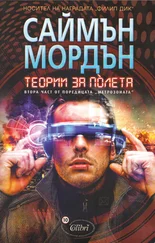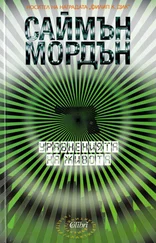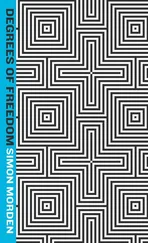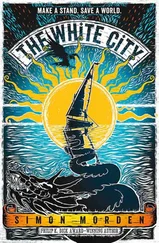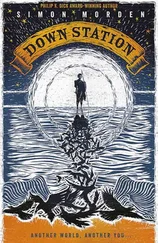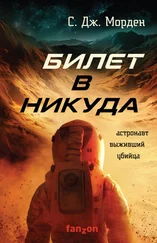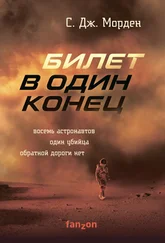“Meet me at the lab. And I still want that body armor.”
“In exchange for that pathetic pea-shooter you call a gun.”
“ Potselui mou zhopy, Chain. I seem to be the only one around here who knows what he’s doing.” Petrovitch’s blanket had fallen in the road. He wrung it out the best he could, adding to the flood at his feet. Then he held it over him and shook his head rapidly to try and clear his glasses.
“When did I stop being Inspector Chain?”
“When I caught you out, zjulik .” He watched Chain’s face fall. “Go on, go. The terrifying truth is that people’s lives might depend on you getting your srachishche moving.”
The rain continued to fall as they stared each other down. The lights changed; red, amber, green. Almost at once, horns started to sound, and those slow in clearing the crossing walked a little faster.
Chain looked down the road past Petrovitch at the block of cars gliding serenely as one again. He bared his teeth in a feral snarl and turned away, back to his own vehicle.
Petrovitch crossed to the other side, and on. He found that he was wet, cold, hungry, he couldn’t go home, he could barely risk going to the lab without police protection, and he had the chill metal touch of gun against his waist.
He realized that he needed to be dry and warm and well-fed, or he’d end up stumbling and slouching to his death. He looked up with his water-spattered eyes at the street names and recognized where he was.
It was only a short walk, but he was shivering by the time he arrived. He could feel his heart large and fragile under his scrawny ribs as he took the steps up to the big wooden doors, still marked with bullets.
The door was closed. He took hold of the black iron hoop and banged it down. The sound echoed away inside. He did it again, then again, then hunched up on the narrow slice of dry stone provided by the doorway.
A bolt slid back, and the door opened to make a sliver of darkness.
He could see her narrowed eye regarding him from her great height.
“Sanctuary,” he said.
Sister Madeleine took him in. She guided him around the plastic buckets dotted along the length of the nave that attempted to catch the copious drips from the roof, stopped to genuflect to the altar, then steered him into the vestry.
Father John wasn’t there.
“Meeting with the bishop,” she said. She took his blanket away, and then wondered what to do with the sodden lump. She threw it out into the church.
“Doesn’t that mean you should be with him?”
“There’ll be more Joans there than priests. He’ll be perfectly safe.” She stared at Petrovitch. “You realize that sanctuary was abolished in the seventeenth century.”
He shivered uncontrollably under her gaze and wrapped his arms around himself. “I didn’t know what else to do.”
“I thought you had a plan for everything,” she said, then added quietly: “You also said I’d never see you again.”
She took a step forward, and for the briefest of moments he thought she was going to enfold him in her own robes. The look of utter panic on both their faces forced them apart.
She whirled around on the pretense of searching for something. “Doesn’t take a genius to pack a raincoat.”
“I had planned to be at the airport. Then something happened, and I found I needed to hang around after all.”
She found an old two-bar electric fire and dragged it to the center of the room, frayed flex trailing behind it. “Needed to, or wanted to?” She crouched low down by the skirting board and forced the yellowed plug into a wall socket. The wires on the fire fizzed sparks and started to glow red.
“I can still go. Walk out, never come back.”
She straightened up, faced him down. “Why don’t you then? Why don’t you just go away and leave me alone?”
“Because I made a promise I have to keep. I made a vow: you know what that’s like, don’t you? A vow so terrible, so final, that it turns you from a human being into an expendable weapon. I’ve burned my bridges, cast my dice, crossed the Rubicon. Whatever metaphor you choose, that’s it.”
She took several deep breaths. “So what is it that you’re going to do? Die of pneumonia at someone?”
“Yeah. Thanks for that. It’d be nice if somebody took me seriously some time soon.” He peeled off his jacket and dumped it on the threadbare carpet, then tried to bend down to unlace his boots. His canvas trousers had become so stiff, and his fingers so weak, that he couldn’t make any impact on the rain-shrunk knots.
Sister Madeleine got to her knees and bent low, worrying at the laces until she’d loosened first one, then the other. She looked up, face framed by her veil. “Can you manage now?”
“I’ll cope.”
“There are some choir robes in that cupboard. Put on as many as you want. It’s not like we have a choir to offend.” She pointed, then strode to the vestry door. “Look, Petrovitch…”
“Sam. It’s Sam.”
She leaned her head against the door frame. “We can be grown-ups about this, right?”
“Yes,” he said, less convincingly than he’d hoped.
“Give me a shout when you’re ready and I’ll make some coffee.”
“We can’t make a start on the communion wine, then?”
She frowned at him. He shrugged damply back.
“It’s in the safe,” she said. “I don’t have the keys.”
“Coffee will be fine,” said Petrovitch, laying his glasses on the desk and grasping the bottom of the death metal T-shirt.
Sister Madeleine saw the logo and the name, closed her eyes and shook her head. “All this in the house of God,” she muttered as she left. She made sure she closed the door behind her.
Petrovitch struggled out of the rest of his clothes, pausing only to examine the scars on his chest. One was long and curving, livid against his shock-white skin, and the others short, raised lines like knife wounds, which is what they were: the work of a single cut of the scalpel. The latest of these bristled with black thread.
Everything he wore had wicked in twice its weight in water. Where he’d dropped his jacket, the red carpet had turned dark. Not good. But there was another door at the rear of the room, and judging from the draft swirling in, it led outside. He bundled up his laundry and threw it there instead.
In one of the heavy cupboards that smelled of incense and age, he found a rail of vestments. The black ones were the priest’s; the gold ones he assumed were for special occasions. Then there were the bewildering array of white garments, some short, some long, some plain, some edged with lace. He had no idea what he was supposed to use.
In the end, he gave up, and took two of the shorter white robes and toweled himself off with them, then chose one of the longer ones to wear. When he finished fighting his way to the neck end, he found he looked like a marquee.
He managed to turn it to his advantage, though, by holding the hem of the robe over the fire and concentrating the meager output of warm, ozone-tainted air inside.
“I’m sort of ready,” he called.
She came back in, stooping through the doorway. When she saw him, she laughed.
“Yeah. Go on. Something to tell all your nun friends back at the convent.”
“Trust me, there’s not much humor in this vocation. Lots of funerals, if you like that sort of thing.” She cleared a space for the kettle and unplugged the fire.
“Hey!”
“If I put both on at the same time, the fuses will blow.”
“I can wire it so they don’t.”
“And will the church burn down afterward?”
“Not in this weather. Maybe later.”
“We’ll do it my way,” she said firmly. She turned the kettle on, and retrieved two mugs from the desk drawer.
Читать дальше
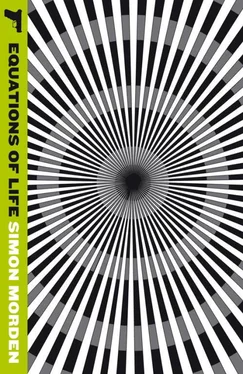
![Саймон Морден - Билет в никуда [litres]](/books/388091/sajmon-morden-bilet-v-nikuda-litres-thumb.webp)
![Саймон Морден - Билет в один конец [litres]](/books/395533/sajmon-morden-bilet-v-odin-konec-litres-thumb.webp)

